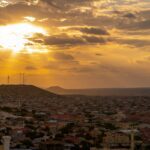Last night, I realized I am living a dystopian novel. While rinsing and re-soaking rags to line the windows and doors of my apartment in Portland, Oregon, I heard President Trump respond to a question on the seriousness of climate change at a press conference on the California wildfires by saying, “it’ll start getting cooler you just watch.” In Portland, we’ve experienced a full week of toxic air — the world’s worst air quality — with little relief in the forecast. My apartment is hot, stuffy, and smoky. Without a proper indoor filtration system, my partner and I are wearing N95s inside to try and minimize the long-term damage to our lungs. Even still, we’re the lucky ones with remote, full-time jobs, a place to stay, power, and clean water.
At least for now. I’m no longer tempting the 2020 fates.
Over the past week, I’ve cycled through feelings of dread, anxiety, stress, and depression. It’s not natural or normal for humans to live under these conditions. But this is precisely the future that environmentalists have warned for decades we would experience because of climate change. Now, it’s no longer the future.
Tell me why a $9 billion emergency budget allocation for a border wall (greater than the total budget of the Environmental Protection Agency) is doing more to keep me safe than aggressive action on climate change?
But now, I’m just tired. It’s hard to fall asleep while taking deep breaths of toxic air, telling yourself everything will be okay, the cats will be okay, the smoke will clear eventually. But, if we keep ignoring the realities of climate change, everything won’t just be okay. We will all suffer. Take it from someone who’s suffering now.
Lying in bed, worried about the future, I find it hard to cope with the frustration. We know exactly what to do, we have the resources, we have the expertise; we just don’t have the political will. Specifically, we have leadership that actively denies science and does the exact opposite of what has to be done. We have a roadmap with the Paris Climate Agreement (the administration pulled out). We had basic environmental air and water protections (the administration reversed them). We have legislation like the Green New Deal (it won’t be debated on the floor of Congress). We even have money if we reallocate — tell me why a $9 billion emergency budget allocation for a border wall (greater than the total budget of the Environmental Protection Agency) is doing more to keep me safe than aggressive action on climate change? We could have even more money if instituted a wealth tax, where billionaires could still be billionaires with just slightly fewer billions.
That money could be used to build nuclear power plants (the best, albeit capital-intensive option we have for sustainable, clean energy). It could be used for climate adaptation projects. It could be used to fund research and new technologies, in the country that boast the world’s top research universities and labs. We could use it to build global partnerships and climate funds with other countries that are bound to experience, and have already experienced, the same dire effects of climate change.
Some folks will lose money. That’s it — that’s the drawback. A small group of individuals and corporations won’t be as wealthy at the end of the day if we act on climate change. My millennial generation probably has the most to lose in that respect. But, I’d take anything to breathe clean air again.
Kelsey Coolidge is the Associate Director of War Prevention Initiative.














